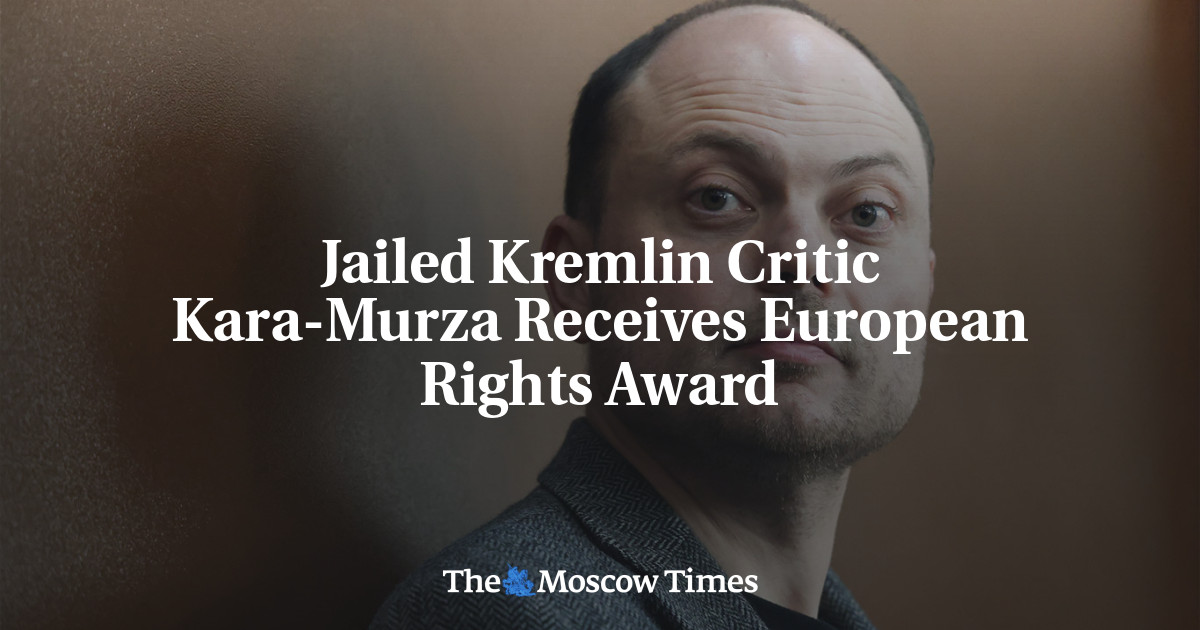
TALLINN, Estonia — Jailed Russian opposition politician Vladimir Kara-Murza has been transferred to a prison hospital, where his lawyers have been unable to visit him since Thursday, his wife and one of his lawyers said Friday.
The development comes as the Kremlin continues its relentless crackdown on dissent, ensnaring thousands of people – prominent opposition activists and ordinary Russians – since the war in Ukraine began in February 2022.
Kara-Murza, 42, was convicted of treason last year for public comments strongly criticizing the Kremlin. He has rejected the charges against him as punishment for standing up to Russian President Vladimir Putin and compared the proceedings to the show trials of Soviet dictator Josef Stalin. He is serving 25 years, the harshest sentence for a Kremlin critic in modern Russia, in a penal colony in the Siberian city of Omsk.
Kara-Murza’s lawyers went to Penal Colony No. 6 on Thursday to visit him, but after hours of waiting they were turned away by prison officials who said he had been transferred to a prison hospital, Yevgenia Kara-Murza and lawyer Vadim Prokhorov said in an online statement Friday. They said the lawyers were also unable to see him in the hospital on Thursday or Friday — hospital staff kept turning them away for various administrative reasons.
Yevgenia Kara-Murza told The Associated Press in an interview Friday that prison officials said her husband had been taken to the hospital for an unspecified “examination.”
“We have no information about Volodya’s condition, why he was really taken to the hospital and what is really happening,” Yevgenia Kara-Murza said. “And unfortunately, we will have (any information) only next week, because on the weekend the entire prison system of Russia is closed.”
Kara-Murza’s wife and lawyers have regularly raised the alarm about his deteriorating health. In 2015 and 2017, Kara-Murza suffered two near-fatal poisonings and developed polyneuropathy, a condition that numbs the feeling in his limbs.
The situation behind bars has slowly deteriorated, especially as Kara-Murza has spent months in solitary confinement, a practice that has become commonplace for Kremlin critics and is widely seen as a way to put more pressure on them.
The politician’s wife, Yevgenia, told the AP on Friday that Kara-Murza’s lawyers, who regularly visit him behind bars, “have not noticed any sharp deterioration in his health during recent visits,” even though “it is only getting worse.”
While Kara-Murza received some treatment during her pre-trial detention in Moscow, she said this was not the case in the penal colonies in Omsk.
“There is a prescription, there is medication that they should have administered,” Kara-Murza said. “But when the lawyer came to the colony with the medication, they said they did not have the equipment to administer the medication intravenously as prescribed, she said.
Earlier this year, Kara-Murza, who rose to prominence as a journalist and wrote columns from prison for The Washington Post, won the Pulitzer Prize for commentary. He has been declared a political prisoner by the prominent Russian human rights organization Memorial, and Western officials have repeatedly called for his release.
Efforts to neutralize the opposition and suppress criticism intensified significantly after the war began, including the adoption of a law effectively criminalizing any public statements about the conflict that deviate from the Kremlin line. The legislation banning “spreading false information” about the Russian military or “discrediting it” has been used against opposition politicians, human rights activists, and ordinary Russians critical of the Kremlin, with many receiving lengthy prison sentences.
According to OVD-Info, a leading human rights organization that monitors political arrests and provides legal assistance, a total of 20,040 Russians were arrested between February 24, 2022, when the war began, and May 20, 2024, for speaking out or demonstrating against the invasion.
A total of 983 people have been criminally prosecuted for their anti-war views, and nearly 9,500 people have been charged with minor charges of discrediting the military, which can be punished with a fine or a short prison sentence, OVD-Info reports.
In the latest developments in the crackdown, prosecutors have sought six-year prison sentences for a Russian theater director and a playwright who are accused of promoting terrorism in a play and have been held for more than a year, their lawyers said Friday.
The lawyers reported in a message on Telegram that the sentence was demanded on Thursday in the trial of Zhenya Berkovich and Svetlana Petriychuk. The case comes at a time when repression of dissidents in Russia has reached a new peak since Moscow sent troops to Ukraine.
Director Berkovich and playwright Petriychuk are being sued over the play “Finist, the Brave Falcon,” about a Russian woman who falls in love online, travels to Syria and, upon returning to Russia, is tried on terrorism charges.
Authorities say the play attempts to justify terrorism, but Berkovich has testified in court that she performed the play to prevent terrorism.
The women’s lawyers noted during the court hearings that the play was supported by Russia’s Ministry of Culture and won the Golden Mask Award, Russia’s most prestigious national theater prize. In 2019, the play was read to inmates at a women’s prison in Siberia, and Russia’s State Penitentiary Service praised it on its website, Petriychuk’s lawyer said.